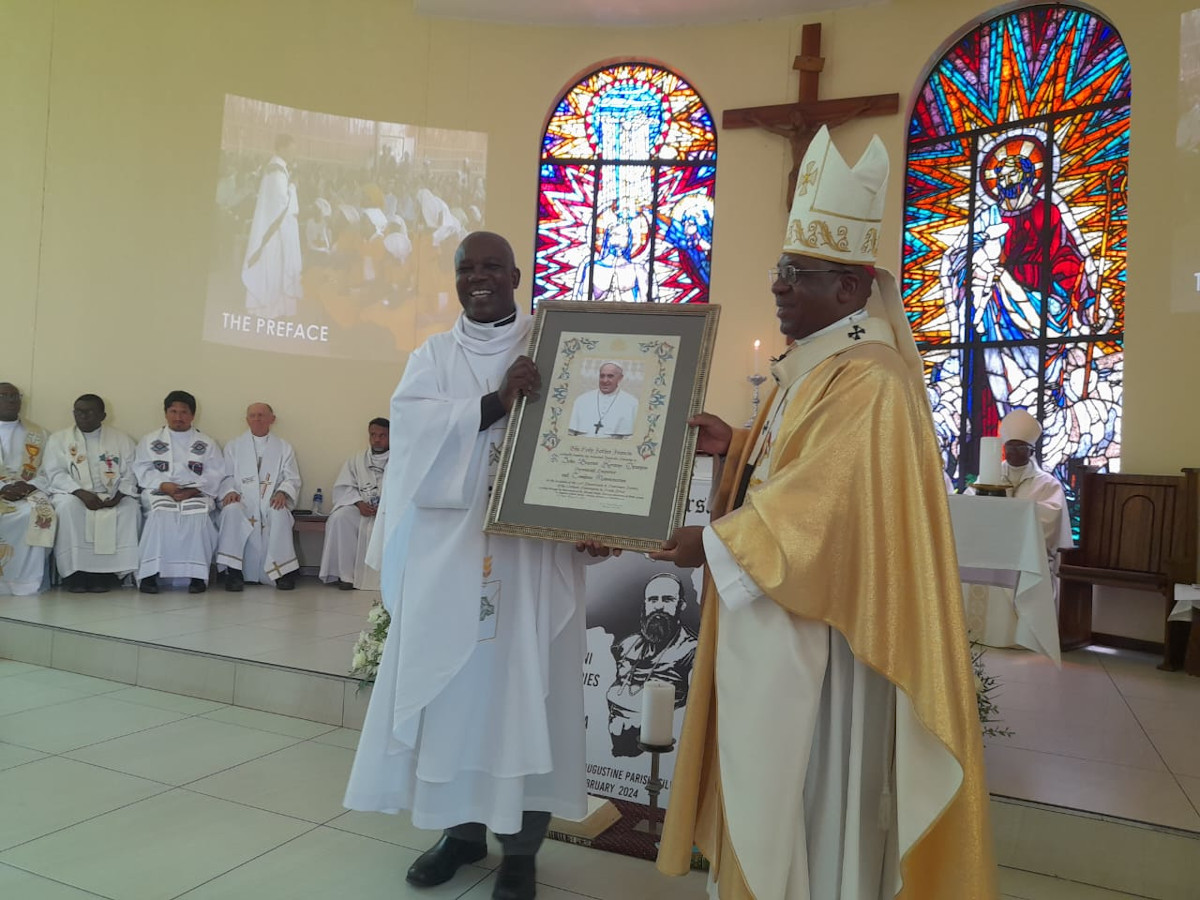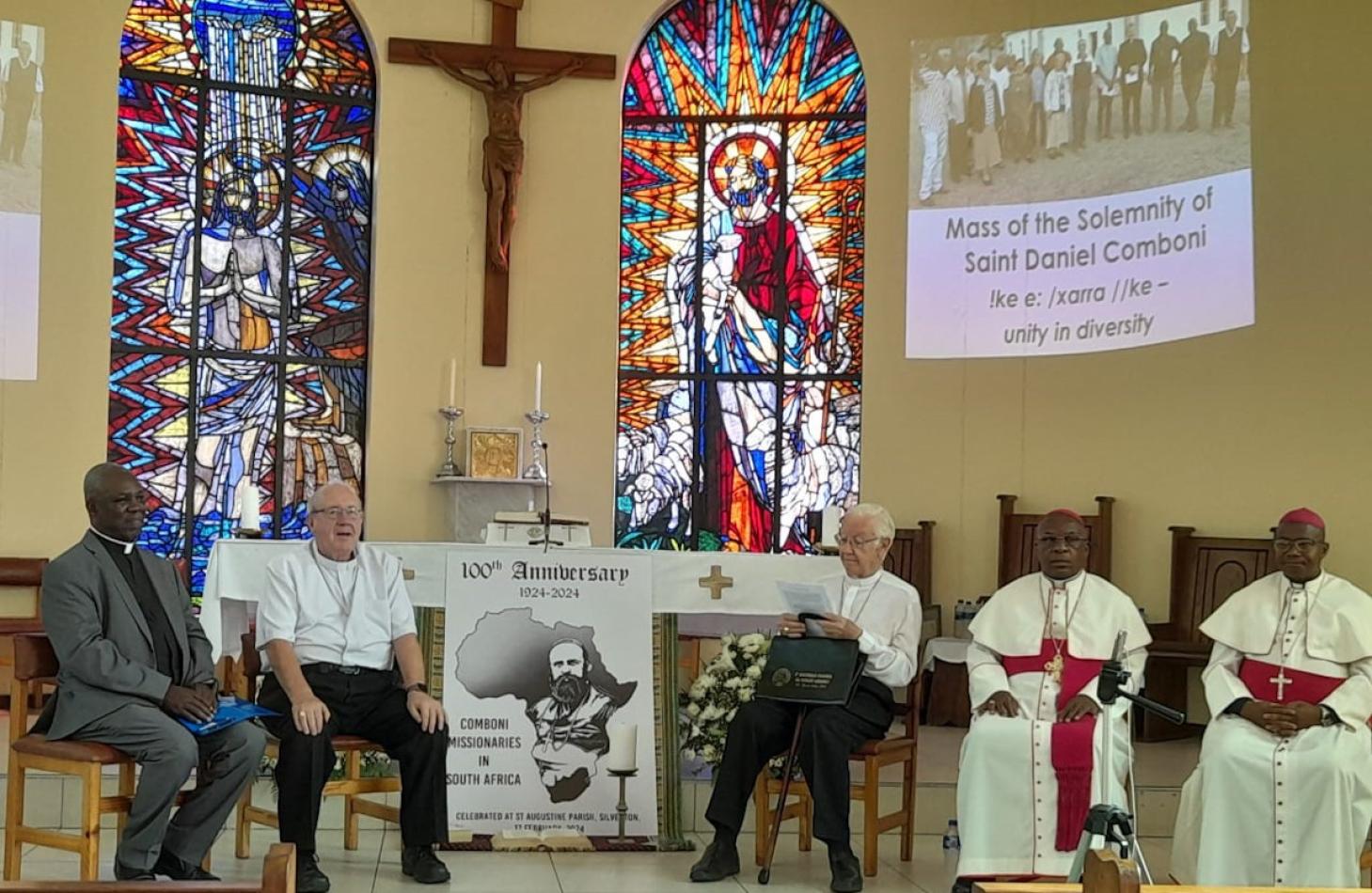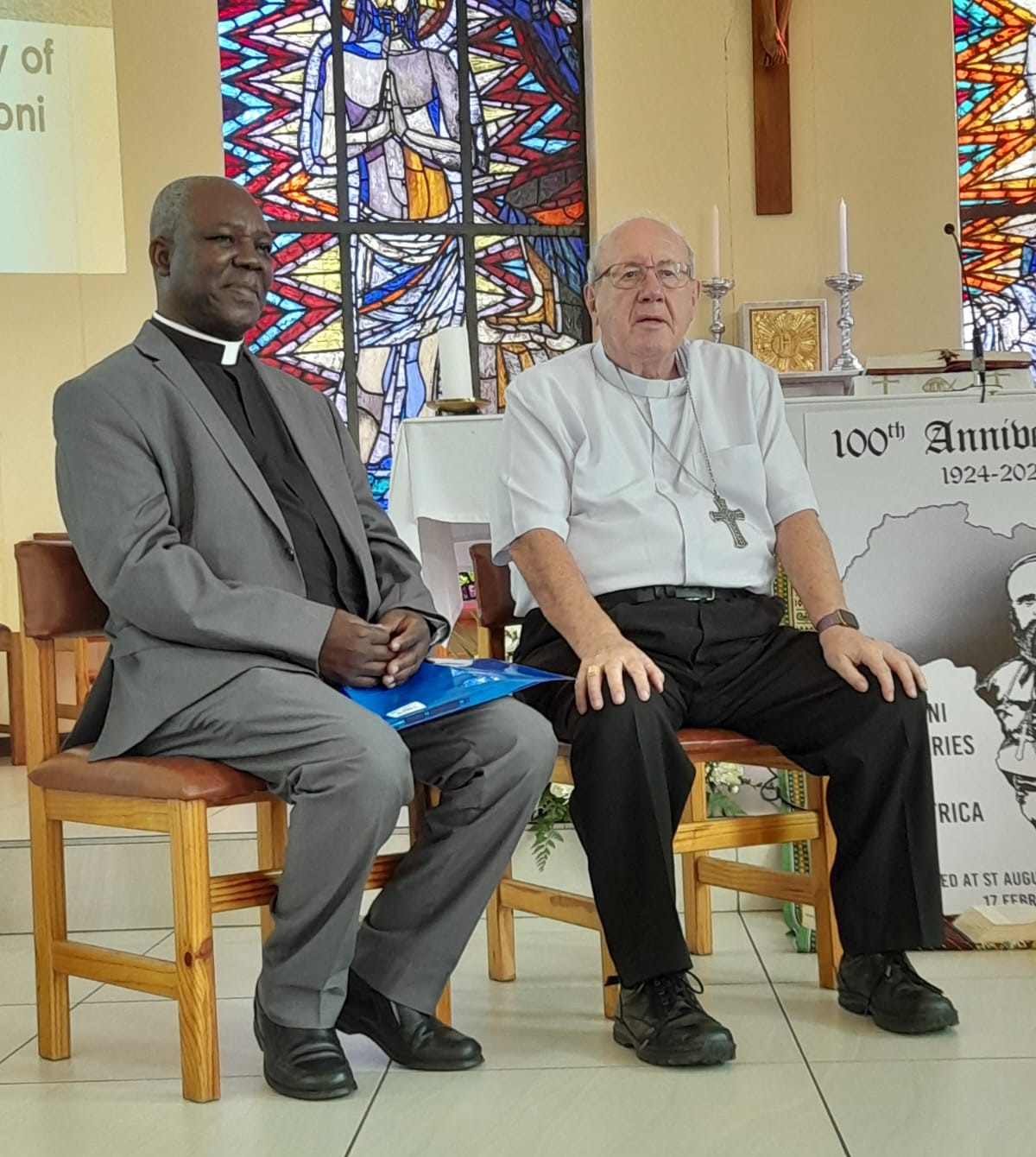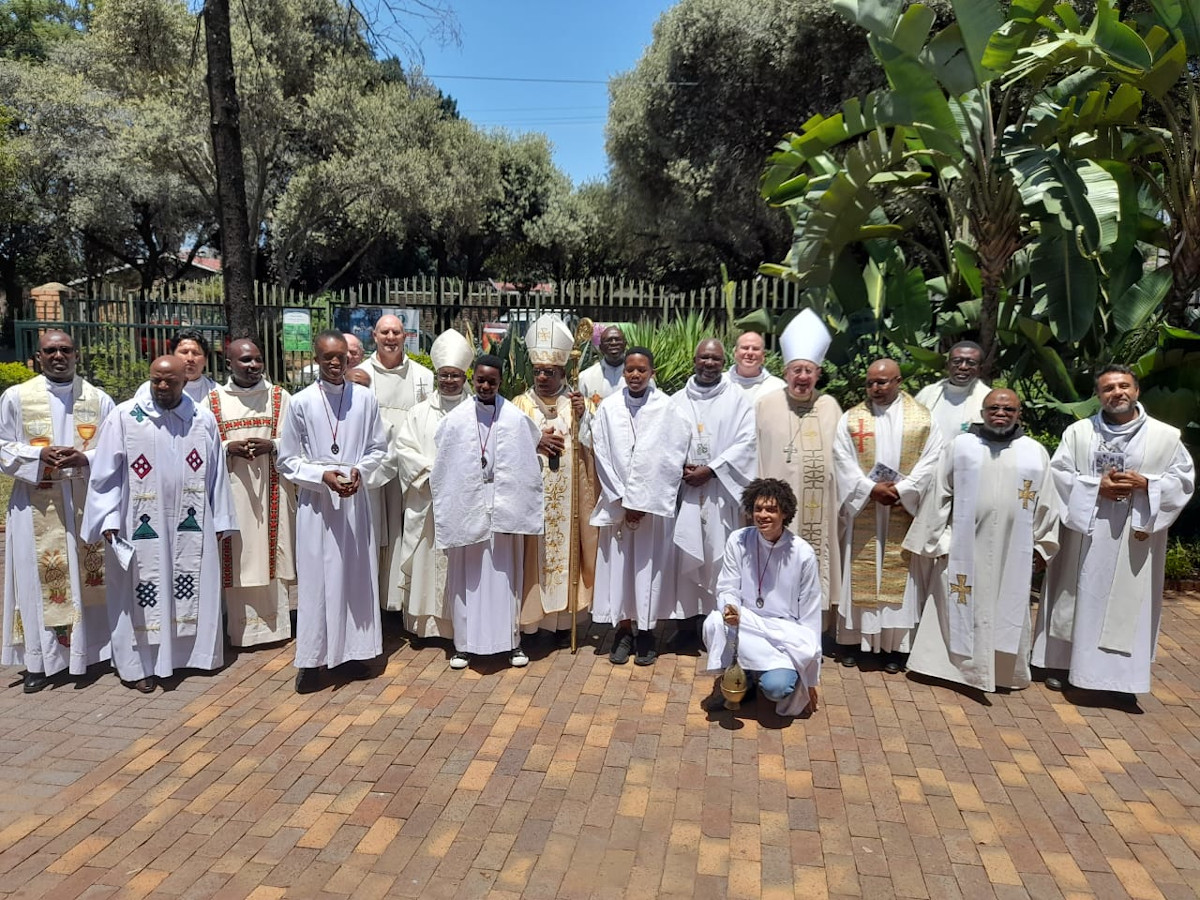Daniel Comboni
Comboni Missionaries
Institutional area
Other links
Newsletter
Monday, February 19, 2024
“I respectfully acknowledge the presence of His Grace, the Most Reverend Anthony Dabula Mpako, the Archbishop of Pretoria who is our Chief Guest today and also our Host, since we are in his Archdiocese. Many thanks indeed for your pastoral closeness and concern in our regard as Comboni Missionaries and indeed to all the other pastoral agents in the Archdiocese of Pretoria.” With these words of welcome and thanks, began his reflection yesterday, 17 February 2024, Fr. John Baptist Keraryo Opargiw, Provincial Superior of the Comboni Missionaries in South Africa, during the celebration of the Comboni Jubilee in the Archdiocese of Pretoria, at our Parish in Silverton. [In Picture: Fr. John Baptist, Mons. William Slattery, Mons. Dabula Mpako, Mons. George Francis, and Mons. John Selemela]
I warmly greet and welcome,
His Grace, Archbishop William Slaterry, OFM, Emeritus Archbishop of Pretoria
His Grace Archbishop George Francis Daniel, Emeritus Archbishop of Pretoria
The Right Reverend Masilo John Selemela – Auxiliary Bishop of Pretoria
A warm welcome to all the Diocesan Clergy, fellow missionaries, religious men and women, the Comboni Friends and all the lay faithful. Your presence makes this celebration an ecclesial and missionary event!
Last but not least, I express my gratitude to the parishioners of St. Augustine Parish and the Committee for the Comboni Jubilee for the energy invested in preparing today’s feast.
“Celebrating our Unity in Diversity” is the leitmotif for the Comboni Centenary celebrations here in Silverton. This is indeed a very appropriate theme as we live in the so-called Rainbow Nation, and our St. Augustine Parish reflects exactly this fact of unity in diversity.
It is interesting to note that St. Daniel Comboni considered his missionary contribution as a Catholic enterprise, where all are protagonists, bringing in their different gifts, actively involved and working together. This is what we are celebrating today – an ecclesial and Catholic event!
Last year when we gathered at Maria Trost, the cradle of our Comboni mission in South Africa, we focused on the past and on the pioneer missionaries who laid the foundations on which we are building today.
However, today, gathered here at Silverton, I would like to draw our attention especially to our Founder St. Daniel Comboni - the man, the saintly missionary and his charismatic legacy, and then, of course, on the present-day Comboni missionaries serving in South Africa and all over the world.
The Spirit of the Lord has been given to me, for he has anointed me. He has sent me to bring good news to the poor, to proclaim liberty to captives and to the blind new sight, to set the downtrodden free, to proclaim the Lord’s year of favour” (Lk 4:18-19).
During his life our Founder St. Daniel Comboni put these words of Jesus into practice, so that they became the common denominator of his whole being and activity. We Comboni Missionaries, in the footsteps of St. Daniel Comboni, recognize ourselves as having been called and sent to proclaim the Gospel to all peoples. We look with faith and courage at the new challenges that the mission presents us with today. Understanding and accepting the new face of mission today requires a conversion of heart and mind for us missionaries as well as for the Local Church. Are we ready for this missionary metanoia?
What can I say about Comboni? Born in northern Italy on March 15th, 1831 Comboni lived only fifty short years, dying on October 10th, 1881 in Khartoum, Sudan. Those few years were, quality-wise, enough for him to accomplish a great deal in the mission. Comboni was a prolific writer. From his many writings, the man and the saint emerge: his deep experience of God, his wholehearted passion for the African mission, his deeply sensitive nature, the depth and breadth of his relationships, which go from lively controversies to great tenderness, the attentiveness to everything related to the problems and reality of mission.
Comboni teaches us how mission means engaging with the fate of the people, feeling part of it, approaching them not as an outsider or a stranger who lives the reality from the outside, looking at others from a distance and from above.
Comboni made common cause with Africans. He believed and trusted the Africans whom he considered not just as targets of evangelization but real subjects and protagonists of Catholic evangelization. Comboni perceived that mission was no longer a personal or an affair of one Congregation, but that it was a commitment of the whole Church. This is Comboni's vision of mission and of the Church - a truly prophetic vision, very much ahead of his time!
When we look at the life of Comboni we see that he gives the impression of being a person gifted with rich and outgoing personality, a man completely committed to the African mission which was his life’s only passion, exploding with initiatives, extremely active in serving this one and only ideal.
He was also a man prone to find himself involved in lively conflicts and tensions, not inclined to retreat or surrender in the face of difficulties. Against such a rich and complex background, how can we characterize Comboni’s particular holiness? One does not become holy in spite of his personality, personal history, contemporary world context but thanks to all these.
We can get an insight from, the historian Gianpaolo Romanato, who writes: “Comboni was neither ascetic nor mystic; he was a complex, energetic man, who came to know God without fleeing the world and without the classical mortifications, a man who understood love in terms of active, virile service to real human beings in their sufferings.” This is Comboni’s type of holiness. So, our take-away lesson here is that we need to appreciate our own human life as the place where God is working out our sanctification and salvation.

Comboni Missionaries in a globalized world today
Globalization is an ambivalent and complex phenomenon where challenges, provocations and hopes are interwoven. There are new opportunities and new risks. Pluralism and relativism challenge us on a daily basis. We live in a liquid society; everything changes and very fast, nothing is permanent. Today we are in the so-called post-truth era. We live in a society where what really matters is appearance and not substance.
We Combonis are not immune to these nefast influences of globalization, we are children of our times. So how are we Combonis coping vis-à-vis this global scenario? The Institute of the Comboni Missionaries is a small Institute of about 1,500 confreres scattered in the four continents of Africa, Europe, Americas and Asia. Our Congregation is however growing rapidly internationally and interculturally, and hence it is undergoing radical change in terms of generation, socially and culturally.
The geography of our vocations is moving from the northern hemisphere to the southern hemisphere, especially Africa. This phenomenon is a blessing and very enriching on the one hand but also inevitably results in tensions and a sense of discomfort that calls for conversion in the hearts of all.
The Institute is enriched by the presence of many elderly confreres who represent a living link with the past and who continue to offer good example by their lives and attention to prayer. Our own African cultural values challenge us to honour the elderly as figures of unity, continuity and wisdom. In the context of a pluralistic society, we Comboni Missionaries commit ourselves to promote a spirit of collaboration, networking and to encourage partnership with the people with whom we live and work, overcoming attitudes of superiority, prejudice and exclusivity.
Scattered all over the world we live our mission above all as the compassion of God towards a divided world, and in concrete terms as first evangelization, mission promotion, the formation of new missionaries and leaders, integral human development, dialogue & inter-religious exchange, commitment to reconciliation and JPIC, inculturation, and solidarity with difficult human situations. This has often put us in the frontline in places like Sudan, South Sudan, Central Africa and Chad. By the way, last week a Mexican confrere Dr. Juan Carlos Ortiz Salgado was kidnapped at Dono-manga in Chad. Thank God he and a Polish volunteer doctor have now both been released.
Our presence in four continents shows us how the Gospel, in different contexts, makes a variety of responses emerge and, in this way, mission becomes a giving and receiving that enriches, deepens and stimulates the understanding and practice of the faith.
Here in South Africa, we currently have eight Comboni communities. In Witbank Diocese, we have three communities: Maria Trost, Acornhoek and Waterval. In the Archdioceses of Pretoria and Johannesburg, we have four communities: Mahube Valley, Silverton, Kensington, Orange Farm. We used to have two communities in Kokstad Diocese: Mount Frere and Mount Ayliff. Finally, in Durban Archdiocese we have our Scholasticate Community attached to a Parish, with 20 youthful confreres. I want to dedicate this Comboni Jubilee to the people of South Africa who have journeyed with the Comboni Missionaries throughout the 100 years in different parts of the country, from Mpumalanga to the eastern Cape, from Gauteng to Kwazulu-Natal.
We believe that our missionary presence in South Africa is still valid and significant. We have 8 autochthon confreres: 3 in the RSA, 2 studying in Rome, one has been assigned to evangelize the English and the Irish, another one is in Chad and the Benjamin of the group is still studying Theology at Pietermaritzburg.
This is a sign of life and hope! I conclude by saying that the Comboni charism is not a property of the Combonis to be guarded jealously but rather it is God’s gift to the whole Church. I challenge the lay faithful here present and especially the youth to be open to a possible call to take up the relay baton of the Comboni charism and share it with others according to your diverse walks of life, professions and vocation.
May this Comboni Centenary Celebration help us to remember the past with gratitude, live the present with courage and look to the future with hope!
Fr. John Baptist Keraryo Opargiw, MCCJ
Provincial Superior






